This uncanny valley of the dolls is a very well-made, fun film with real heart and a wink but perhaps too many smooth areas
Talk about product placement. Ever since Margot Robbie and Ryan Gosling (both, lest we forget, survivors of the artificial worlds of Aussie soaps and the Disney Club) rollerbladed down that Venice Beach boardwalk last summer, it seems the whole world has turned pink.
The headlong rush into desperate marketing has seen such horrors as a well-known burger giant serving up a pink Barbie-themed meal, Barbiecore fashion turning a parade of fashionistas into fusions of fuchsia, rocketing sales of scrunchies, blond hair dye, leotards and maybe even a spike in record sales for Aqua, the Danish-Norwegian pop stars who first twigged the comedy potential of the vacuous doll as far back as 1997.
Mattel must be seeing stars with all these marketing crossovers - even before the main event hits the big screen.
Barbie the movie comes from the husband-and-wife team of Greta Gerwig and Noah Baumbach and there has been some mighty silly gnashing of tweets that these two giants of indie filmmaking have sold out by making a kid's comedy about an icon of trashy consumerism. Which is rather missing the point.
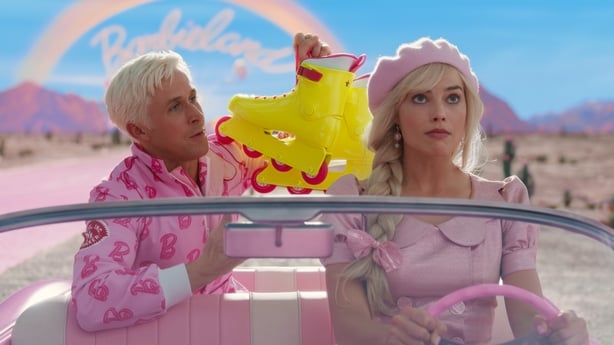
Both movie makers hallmarks are all over Barbie, from the Kubrick satire of the brilliant opening scene to the cute, clever, and yes, subversive closing gag. The whole hot pink mess is narrated archly by an indomitable Helen Mirren, who sets the scene and frequently barges in with her own pitchy and occasional catty remarks.
Margot Robbie plays the living doll brilliantly. She’s Proto Barbie, the original perky, pretty and glossy Pangloss of dress-up. This serenely virtuous Barbie lives blissfully in a Stepford-like Barbie Land where men are Ken and women are prettified vessels for little girls and men in suits to dream about and mould into their own fantasies.
Mirren narrates a potted history of how the fantastic femme first plopped off a production line as a statuesque piece of thermoplastic polymer in 1959 (later in the movie, a great Rhea Perlman makes a winning cameo as Barbie’s creator and Mattel president Ruth Handler, full of Yoda-like wisdom and some zinger one-liners).
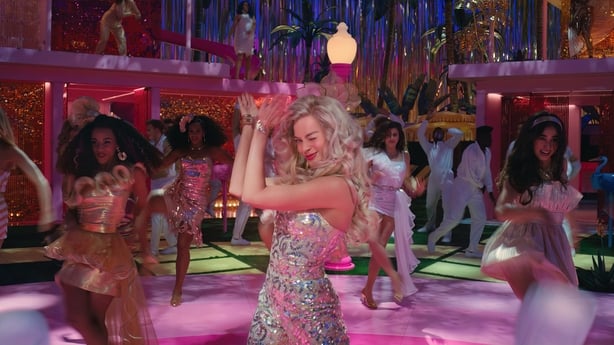
Of course, Barbie has long outgrown her Atomic Age (oops!) origins and become the ultimate icon of aspiration - there is now Doctor Barbie, Judge Barbie, News Reporter Barbie, Airline Pilot Barbie, and such, ahem, discontinued lines as Pregnant Barbie. ("Because who wants a pregnant Barbie," sniffs Mirren, getting the genitalia issue out of the way early). An Eco-friendly Barbie would be a contradiction in terms, although apparently Mattel are working on that.
In this world of make believe, the White House is pastel pink, and the Supreme Court is made up of women only. It’s a gilded pink gynarchy where the blankly asexual Kens are blissfully unaware of such real world matters as the patriarchy and women’s liberation.
In fact, like a voodoo doll in reverse, Barbie has fulfilled every woman’s dreams and the real world is an idyll of equality and harmony between the sexes - all delivered by the kindly benefactors at Mattel with aspirational missionary zeal.
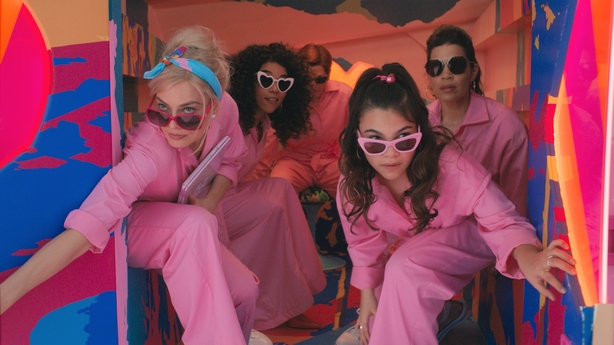
However, when Barbie awakes one day to find herself troubled by something as verboten as her own sense of mortality and, worse, the appearance of cellulite on her thighs and eek! flat feet, her world begins to collapse.
There’s only one solution; Barbie must find the cause of her crisis in the real world. Meanwhile, Ryan Gosling really gets into his role as Ken. All six pack and perma tan, he’s the blankest of all the Kens and spends his life trying to make Barbie notice him as something more than just another hunk of plastic eye candy. He uses the word "beach" as a verb.
When he and Barbie journey to reality, the movie makes a screeching tonal shift but not that screeching. All too aware of the 12a cert, the real world (and it is worth noting that Ireland does not feature on the Barbie world map but there is a blob called England), isn’t quite the fun we might have expected, like, say, the culture clash between 70s squeaky clean and 90s grunge of those great Brady Bunch movies.
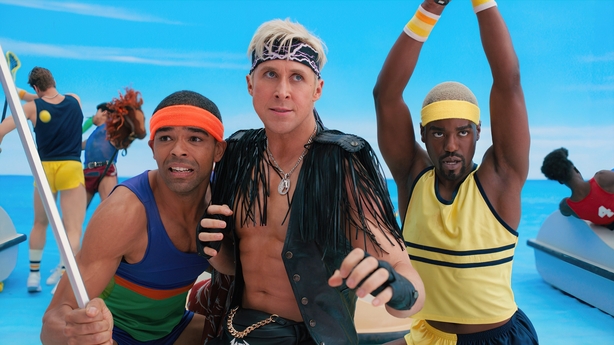
Sure, Barbie is out of her box, but it’s all a bit more Mannequin on the Move than Gerwig and Baumbach might care to admit.
Mattel are not just in on the joke. It’s their joke. However, unlike the gnarly and hilarious Lego movies, Barbie was never going to stray too far from the corporate message. Don’t expect any Wizard of Oz reveal.
Up in the Mattel building, a phallus of a skyscraper in downtown LA, Will Ferrell does his manic man-child act as MD and his executive underlings are all identikit men in black suits who pretend to be paternally dedicated to the happiness of little girls and not the bottom line. When questioned by Barbie about why the real world is not quite the Elysium of equality she expected, one of them remarks, "I’m a man with no power. Does that make me a woman?"
But it’s Ugly Betty star America Ferrara as lowly Mattel receptionist Gloria who embodies the movie’s message. In a key scene that ushers in the third act, she delivers a remarkably clear-eyed and brilliant #MeToo aria about how women are still second-class citizens, even after all these millennia of oppression and struggle. It certainly wipes the dopey grin off your face.
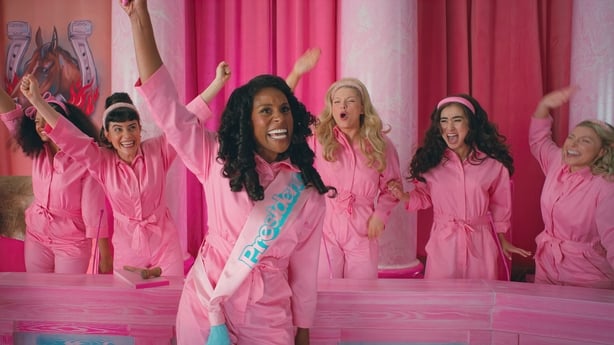
It sure looks gorgeous. The colours pop and the cast are picture perfect. Meanwhile, the Truman Show limitations of Barbie Land become all too apparent when Ken attempts to show off his surfing skills and prangs off a rigid wave of moulded plastic.
And in the same way that only males will flock to Oppenheimer and only females will flock to Barbie, there are laughs to be had when the newly empowered Kens are undone when they are hoodwinked by the Barbie collective into mansplaining stuff like indier-than-thou US band Pavement and The Godfather.
When it’s good, it’s a very good takedown of the patriarchy. It elegantly skewers depressingly prevalent notions of what little girls and grown women are meant to know, do, feel, and think. When it’s not so good, Gerwig and Baumbach’s tonal shifts into affirmation muddy the flow of pink champagne and lemonade. And why didn’t anyone think to make the obvious Taylor Swift joke?
Still, as Ferrara intimates in her movie-stealing speech, you can’t have it both ways and maybe Spike Lee is already plotting his own Black Barbie revenge flick. Barbie has already set MAGA heads spinning in confusion and rage, so extra points for that.
Not quite the meta feelgood hit of the summer, then. And not quite a cutting commentary on sexual equality either. This uncanny valley of the dolls is, however, a very well-made, fun film with real heart and a wink but perhaps too many smooth areas.
Alan Corr @CorrAlan2













